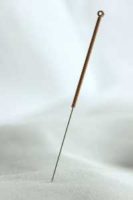16 May Does Acupuncture Increase Live Births For Women Undergoing IVF?
MedicalResearch.com Interview with:
 Caroline Smith, PhD
Caroline Smith, PhD
Professor Clinical Research
Western Sydney University Research Theme Champion Health and Wellbeing
MedicalResearch.com: What is the background for this study? What are the main findings?
Response: Despite technological improvements to IVF the success of IVF treatment remains low. Consequently, new drugs, laboratory techniques and other treatments need to be developed and rigorously tested to explore their effects on producing healthy babies for women undergoing IVF. In 2002, the first randomised controlled trial of acupuncture administered a specific form of IVF acupuncture at the time of embryo transfer.
The results indicated the chance of achieving a pregnancy from acupuncture was twice that to women undergoing IVF treatment alone. From mid 2000s many women have started to use adjunctive treatments such as acupuncture whilst undergoing IVF. We conducted and reported on a pilot study in 2006 which produced results suggesting a benefit. It is important that these findings were rigorously examined in a larger trial.
Findings are presented from our trial presented in JAMA. Our study of over 800 Australian and New Zealand women undergoing acupuncture treatment during their IVF (in vitro fertilization) cycle has failed to confirm significant difference in live birth rates.
MedicalResearch.com: What should readers take away from your report?
Response: We recommend these findings are communicated to women when making evidence informed decisions about the use of acupuncture to improve their reproductive outcomes.
However, as reported in other studies, and other outcomes from our trial which we have not yet reported on, there are other important outcomes from acupuncture that women value whilst doing IVF treatment. These include feeling relaxed, less stressed and feeling better about themselves. Further research can still be undertaken exploring the roles of these outcomes as part of women’s IVF care.
MedicalResearch.com: What recommendations do you have for future research as a result of this study?
Response: We recommend future research studies re-focus efforts to examine the effectiveness of acupuncture compared with other active treatments. In addition, research should focus on a greater number of treatments and the optimal timing of treatment. This research could focus on the psycho-social effects of acupuncture as well as replicating research that suggest acupuncture may influence the blood flow to the ovaries and uterus.
Conflict of Interest Disclosures:
Caroline Smith declares as a medical research institute, NICM Health Research Institute receives research grants and donations from foundations, universities, government agencies and industry. Sponsors and donors provide untied and tied funding for work to advance the vision and mission of the Institute.
The paper, Effect of acupuncture vs sham acupuncture on live births among women undergoing in vitro fertilization: a randomized clinical trial is available online:https://jamanetwork.com/journals/jama/fullarticle/10.1001/jama.2018.5336
The researchers acknowledge the support of the National Health and Medical Research Council (NHMRC) Grant/Award number APP1003661; and needles were supplied from Helio Supply Co.
Citation:
[wysija_form id=”3″]
The information on MedicalResearch.com is provided for educational purposes only, and is in no way intended to diagnose, cure, or treat any medical or other condition. Always seek the advice of your physician or other qualified health and ask your doctor any questions you may have regarding a medical condition. In addition to all other limitations and disclaimers in this agreement, service provider and its third party providers disclaim any liability or loss in connection with the content provided on this website.
Last Updated on May 16, 2018 by Marie Benz MD FAAD
